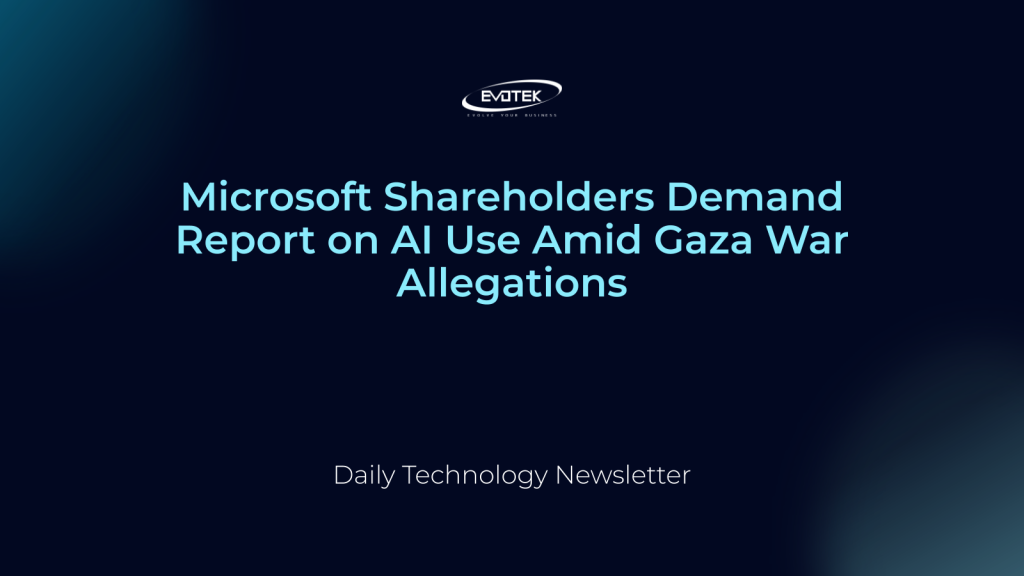A coalition of over 60 Microsoft shareholders has submitted a formal proposal, slated for a vote at the company’s upcoming Annual General Meeting. This significant action seeks a comprehensive report on Microsoft’s “human rights due diligence” (HRDD) processes, specifically concerning the potential misuse of its artificial intelligence and cloud products by customers in ways that violate human rights or international humanitarian law.
The resolution asserts that while Microsoft claims to conduct ongoing HRDD in line with UN Guiding Principles, it has not adequately explained its processes related to customer end-use, nor has it reported on their effectiveness. Recent serious allegations of customer misuse suggest a potential failure in Microsoft’s HRDD mechanisms.
In response to claims of complicity in alleged international crimes, Microsoft previously issued a statement in May. The company stated it conducted an internal review and engaged a third-party firm, concluding “no evidence to date that Microsoft’s Azure and AI technologies have been used to target or harm people in the conflict in Gaza.” However, the shareholders’ resolution criticizes this statement for lacking crucial details, such as the nature of assessments, the definition of “harm,” and the identity of the external firm. A key admission by Microsoft in that statement was, “Microsoft does not have visibility into how customers use our software on their own servers or other devices,” highlighting a significant gap in oversight.
Context: Gaza Conflict and Technology Use
The pushback follows a February 2024 Associated Press report indicating a “skyrocket” in Israel’s use of Microsoft and OpenAI technology after the October 2023 Hamas attack. While the Israel Defense Forces (IDF) reportedly use AI-enabled systems to aid target identification, claiming independent examination by high-ranking officers to meet international law, the devastating toll of the assault on Gaza has raised widespread concerns. A United Nations commission, for instance, found in October 2024 that Israel “perpetrated a concerted policy to destroy Gaza’s healthcare system as part of a broader assault on Gaza, committing war crimes and the crime against humanity of extermination.”
Escalating Protests and Activism
The ongoing conflict and increasing awareness of Microsoft’s ties to the Israeli military have fueled significant criticism and protests. In April, former Microsoft employee Ibtihal Aboussad was terminated after interrupting the company’s 50th-anniversary celebration to demand an end to “using AI for genocide.” Larger demonstrations took place both inside and outside Microsoft’s Build conference in May. Even art-rock icon Brian Eno, known for composing the Windows 95 startup sound, publicly called on Microsoft to sever ties with Israel, stating that knowingly building systems enabling war crimes inevitably leads to complicity.
The current shareholder resolution marks a significant escalation in these efforts. The involved shareholders represent over $80 million in Microsoft shares. While this is a small fraction of Microsoft’s total valuation, Rewan Haddad, campaign director at consumer watchdog Eko, noted that the resolution boasts the largest number and diversity of co-filers ever for a single Microsoft shareholder resolution. This, Haddad stated, “shows the scale of shareholder frustration with Microsoft.”
Dual Motivations: Ethics and Business
The resolution itself underscores that “Inadequate HRDD exposes Microsoft to material legal, operational, and reputational risks,” which can negatively impact shareholder value. This business-focused language appeals to many investors whose primary concern is financial return. However, the Religious of the Sacred Heart of Mary, the lead filer of the resolution, emphasized in a statement that “the moral issue is paramount.”
This is not the first time the Religious of the Sacred Heart of Mary has spearheaded shareholder action concerning Microsoft’s human rights commitments. In 2021, they led a proposal urging the company to evaluate human rights impacts related to product development and relationships with government agencies, including law enforcement, that carry high human rights risks. Microsoft agreed to address these concerns in October 2021.
The shareholder resolution, calling for a report on Microsoft’s human rights due diligence processes, is set to be voted on at the company’s Annual General Meeting later this year.

 日本語
日本語 한국어
한국어 Tiếng Việt
Tiếng Việt 简体中文
简体中文